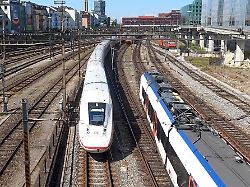“Bear it”
Frustrated Swiss give advice to German train drivers
December 19, 2023, 10:39 a.m
Listen to article
This audio version was artificially generated. More info | Send feedback
In neighboring countries such as Austria and Switzerland, rail traffic usually runs smoothly. However, trains from Germany cause frustration. The Swiss see border traffic in “crisis mode” for the next few years. Advice to German train drivers is unlikely to give them much hope.
Switzerland is preparing for two more years of “crisis mode” when it comes to rail traffic across the Rhine route from Germany. That’s what Peter Füglistaler, director of the Swiss Federal Office of Transport, said. When asked who hadn’t done their homework when expanding the freight rail corridor from Rotterdam on the North Sea to Genoa on the Mediterranean, Füglistaler said: “Germany.”
Switzerland and Italy are far. At least the important decisions in Germany have finally been made. “In 2024 and 2025 it is foreseeable that there will be several major construction sites and closures. We will be in crisis mode.” This applies to freight and passenger transport.
Switzerland and Germany agreed in a state treaty in 1996, among other things, that the German Karlsruhe-Basel route would be expanded to four lanes. This should create more space for passenger and freight trains.
Many freight trains are canceled
The Swiss are frustrated by delays and delays in cross-border passenger trains from Germany. Meanwhile, trains that are 10 to 15 minutes or more late are suspended at the border. The Swiss railways SBB use their own trains from Basel with punctual departures. Guests from Germany then have to change to the next train there.
“To save Germany’s honor, I have to say: the existing corridor works to some extent,” said Füglistaler. Today’s traffic volume can be managed, but only “with very poor quality.”
Due to operational inadequacies, many freight trains were canceled. “The strongest argument for rail freight transport is reliability.” It’s less about speed than clear promises about when goods will arrive where. “We cannot keep this promise at the moment. We also need to work massively on quality.”
“Stick with the train, endure it”
Füglistaler’s message to Deutsche Bahn customers: “Don’t give up hope,” he said. “Stick with the train, bear with it, it will get better. But it takes time. So be patient.” His message to the transport minister: “The future is simply the railways. You need decisions and political will. And stamina.”
A Deutsche Bahn spokeswoman admitted that other priorities had been set in rail transport policy for decades. “This has significantly delayed the expansion on the German side in direct comparison with neighboring countries.” Citizen protests almost stopped the expansion completely for years. But a third of the 200-kilometer route between Karlsruhe and Basel is now in operation. “By 2035, Deutsche Bahn will have the continuous four-track system between Karlsruhe and Basel and by 2041 the complete expansion for speeds of up to 250 kilometers per hour.”
